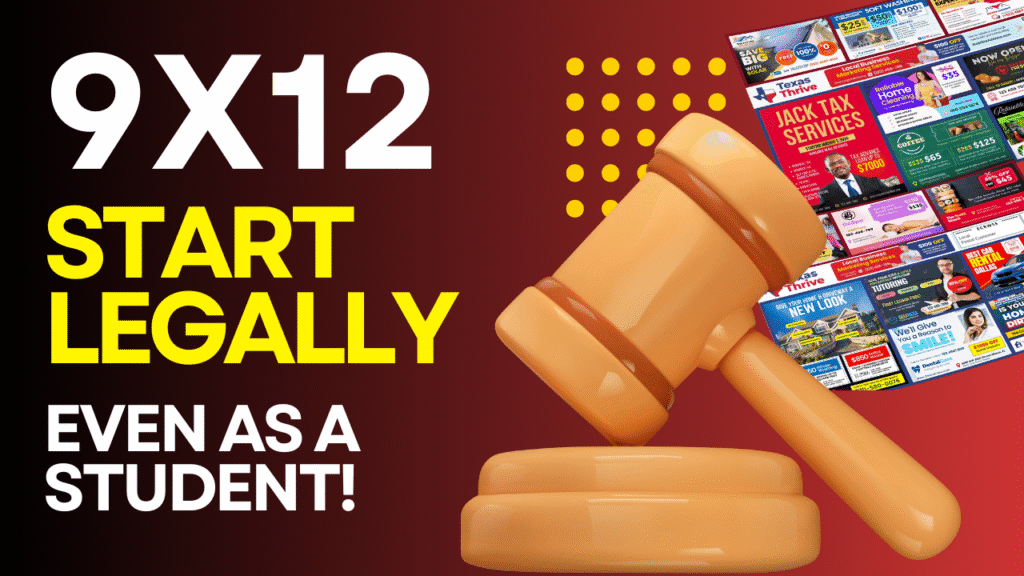A Simple Guide to Launching Your Shared-Cost Postcard Business Without the Legal Headaches
Thinking about launching a co-op EDDM agency while you’re still in school or working a full-time job?
Good news:
You can legally start and run this business without quitting your job or becoming a full-time entrepreneur overnight.
In this guide, I’ll break down the simplest legal setup, the right way to accept money, and how to build your business without stress.
First: You Don’t Need a Company to Get Started (But You Should Plan One)
In the U.S. (and many other countries), you can legally operate a sole proprietorship — that means you are the business, without needing to register anything at first.
- You can collect money.
- Pay taxes later (usually via your personal return).
- And legally provide services under your own name
BUT — if you want to look more professional, open a business bank account, or scale in the future, it’s smart to take 1–2 extra steps:
Step 1: Register a DBA (Doing Business As)
A DBA allows you to operate under a business name (like “PeakMailers” instead of your own name).
Why it’s useful:
- You can receive payments in your business name.
- Clients will take you more seriously.
- You can open a business bank account.
You can usually register a DBA at your county clerk’s office or state website. It costs anywhere from $15 to $75 and takes about 15–30 minutes online.
Step 2: Get a Business Bank Account
Once you have your DBA certificate (or LLC, if you choose that route), go to your local bank and open a business checking account.
Why this matters:
- Keeps your personal and business finances separate
- Makes taxes much easier
- Adds legitimacy
You’ll need:
- Your DBA certificate (or LLC docs)
- Personal ID
Step 3 (Optional): Register an LLC Later (If You Want)
An LLC (Limited Liability Company) gives you:
- Legal protection (your personal assets are safer)
- More tax options Instant credibility
But it’s not required to start.
If you’re just doing 1–2 mailers per month, a DBA + business bank account is enough. You can always file an LLC later.
Note: Some states allow you to use your existing LLC (if you already have one) and simply register a new DBA under that LLC for your EDDM agency.
Step 4: Accepting Payments the Right Way
Here are 3 easy ways to collect ad payments from businesses:
- Stripe or PayPal Business Account (linked to your business bank)
- Zelle or Venmo for Business (check local limits)
- Bank transfers or cash (offline clients)
Make sure to keep a record of who paid and for which campaign. A simple Google Sheet is fine to start.
Step 5: USPS EDDM Account Setup
Even as a student or part-time worker, you can register a free account at: https://eddm.usps.com
There’s no business license or EIN required to use it.
With your account, you’ll be able to:
- Select delivery areas (ZIPs and routes)
- Pay for mailings
- Print required paperwork
- Track delivery status
Make sure to keep a record of who paid and for which campaign. A simple Google Sheet is fine to start.
Bonus Tip: Make It a Side Hustle That Grows Over Time
If you’re in college, or already working 9–5, you don’t need to go “all in.”
Here’s a simple, low-risk approach:
- Run just one card a month to one ZIP code
- Target 12–16 local businesses per card
- Charge $300–$600 per advertiser
- Pocket the difference after printing and mailing costs
Once you’ve done it once and have happy clients, repeat it. Then scale.
Want Everything You Need to Start Right Now?
To make it even easier, we built a Starter Kit that includes:
- 4 Canva postcard templates
- 50+ editable local business ads businesses per card
- A ready-to-use WordPress agency website
- Demo install service + video training
- A built-in form to collect ad payments
All-in-one. No subscription. One-time payment.
Get it now at 9x12agency.com
Final Checklist to Start Your EDDM Side Hustle Legally:
- Choose your business name
- Register a DBA (or LLC later)
- Open a business bank account
- Set up Stripe/PayPal/Venmo to collect payments
- Register a USPS EDDM account
- Build your first card & pitch businesses
You can do this legally, ethically, and professionally — even as a student or employee.
Just start small, focus on local trust, and grow it at your own pace
